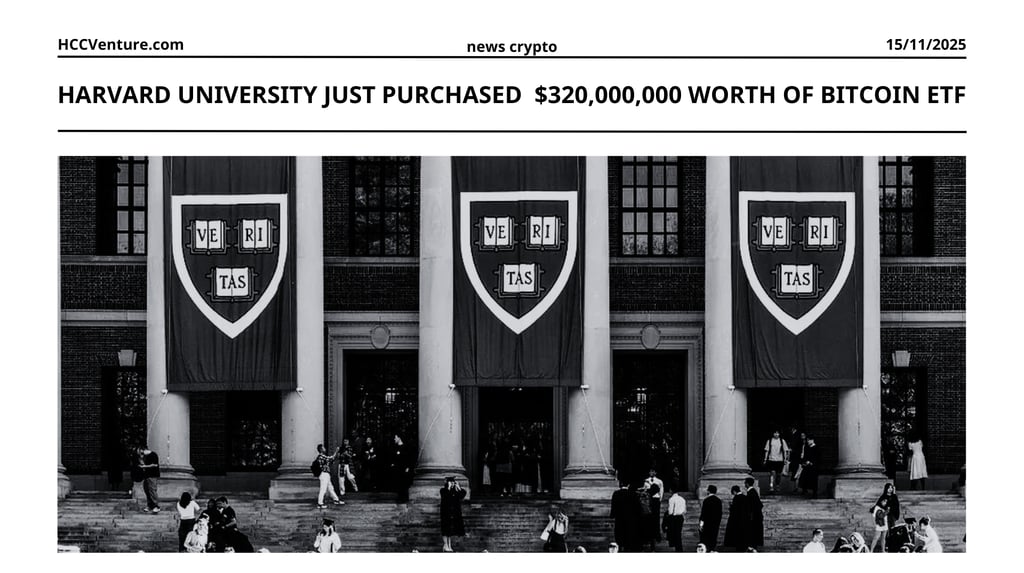Harvard University Just Bought $320,000,000 Worth of IBIT's Bitcoin ETF
Harvard University has increased its stake in BlackRock’s iShares Bitcoin Trust (IBIT) by 257% to a whopping $442.8 million, making the ETF the largest position in its US portfolio.
11/15/20252 min read


Harvard University Investment Campaign
In a move that underscores the growing institutional acceptance of digital assets, Harvard University – one of the world’s most prestigious academic institutions and home to the largest university endowment globally – has reportedly purchased a $320 million Bitcoin ETF.
The investment, disclosed through a recent filing with the U.S. Securities and Exchange Commission (SEC), makes Harvard one of the first Ivy League endowments to publicly allocate capital to Bitcoin through managed exchange-traded funds, signaling a profound shift in how long-term institutional investors view the asset class.
From caution to long-term confidence
Harvard’s participation in the Bitcoin ETF marks a turning point for institutional adoption in academia. Previously, university endowments like Harvard, Yale, and Stanford have been cautious about approaching cryptocurrencies through venture capital funds, indirect investments in blockchain startups, or infrastructure projects.
Now, by purchasing a spot Bitcoin ETF, Harvard has moved from indirect exposure to direct market participation – a significant leap of faith for institutions.
The investment is part of a broader diversification strategy by Harvard Management Company (HMC), which manages more than $50 billion in investment fund assets, according to insiders. The allocation to Bitcoin ETFs, which represents about 0.6% of total assets, is intended to hedge against macroeconomic uncertainties while capturing growth opportunities from the saturated digital asset market.
Why a Bitcoin ETF?
The decision to access it through an ETF rather than holding Bitcoin directly reflects institutions' preferences for compliance, custody, and liquidity.
The spot Bitcoin ETF — approved by the SEC earlier this year — allows investors to gain regulated exposure to Bitcoin price movements while avoiding operational complexities like managing private keys or directly custodying wallets.
Harvard's ETF exposure is said to include allocations to multiple issuers, such as:
BlackRock's iShares Bitcoin Trust (IBIT).
Fidelity Wise Origin Bitcoin Fund (FBTC)
Franklin Templeton EZBC ETF
Together, these ETFs represent the most liquid and institutionally regulated access to Bitcoin in the US financial system.
Evaluation and Conclusion
Harvard University’s acquisition of a $320 million Bitcoin ETF is more than just a splashy headline—it’s also an important sign of academic and institutional recognition of digital assets. By entering the market through regulated ETFs, Harvard demonstrates a pragmatic, compliance-focused approach that balances innovation with fiduciary discipline.
As the lines between traditional finance, academia, and blockchain continue to blur, this move may be remembered as a defining moment in Bitcoin’s institutionalization — when even the world’s most conservative endowments began to view digital assets not as a risk, but as a liability.
Disclaimer: The information presented in this article is the author's personal opinion in the cryptocurrency field. It is not intended to be financial or investment advice. Any investment decision should be based on careful consideration of your personal portfolio and risk tolerance. The views expressed in this article do not represent the official position of the platform. We recommend that readers conduct their own research and consult with a professional before making any investment decisions.
Explore HCCVenture group
HCCVenture © 2023. All rights reserved.

Connect with us
Popular content
Contact to us
E-mail : sp_contact@hccventure.com
Register : https://linktr.ee/holdcoincventure
Disclaimer: The information on this website is for informational purposes only and should not be considered investment advice. We are not responsible for any risks or losses arising from investment decisions based on the content here.


TERMS AND CONDITIONS • CUSTOMER PROTECTION POLICY
ANALYTICAL AND NEWS CONTENT IS COMPILED AND PROVIDED BY EXPERTS IN THE FIELD OF DIGITAL FINANCE AND BLOCKCHAIN BELONGING TO HCCVENTURE ORGANIZATION, INCLUDING OWNERSHIP OF THE CONTENT.
RESPONSIBLE FOR MANAGING ALL CONTENT AND ANALYSIS: HCCVENTURE FOUNDER - TRUONG MINH HUY
Read warnings about scams and phishing emails — REPORT A PROBLEM WITH OUR SITE.
